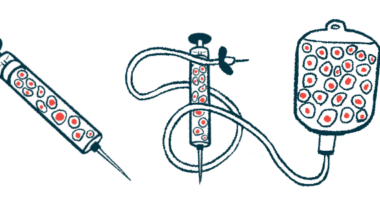Aspen to collect patient data remotely before its cell therapy trial
Rune Labs' platform to help characterize symptom activity for screening study

Aspen Neuroscience will use Rune Labs’ digital health platform to remotely collect data from Parkinson’s disease patients currently enrolled in a screening study.
The goal of the Trial-Ready Cohort Screening study is to provide a comprehensive view of the disease ahead of patient recruitment for Aspen’s Phase 1/2 clinical trial of ANPD001, an experimental stem cell therapy designed to replace the nerve cells that are lost in Parkinson’s disease.
The use of Rune’s StriveStudy platform, following a collaboration agreement, allows Aspen to collect patient data in real time and over an extended period using the Apple Watch.
“Real-time, long-term patient data generated from the cutting-edge StriveStudy platform, will allow us to capture crucial information as we continue to develop our personalized cell therapy,” Damien McDevitt, PhD, Aspen’s president and CEO, said in a press release.
“Using StriveStudy with our Trial-Ready Cohort Screening Study participants initially will provide us with a better understanding of our patients before we begin our Phase 1/2a clinical trial,” he added.
Data collected to supplement information gathered from in-person clinical visits
“By collecting objective, continuous data longitudinally [across time], our collaboration with Aspen signifies a new way to gain a complete, overall view of disease and evaluate treatment benefit, supplementing information gathered from in-person clinical visits,” said Brian Pepin, CEO of Rune Labs.
Rune Labs will compile patients’ symptom data, and global activity parameters, including daily steps, medication tracking and compliance, and other data relevant to a patient’s well-being.
“The visionary team at Aspen recognizes the importance of understanding each trial participant’s unique experience of Parkinson’s disease made possible through high frequency data collection from our low burden technology. We’re excited to work with Aspen’s high-caliber team and help them bring a much-needed therapy to patients in need,” Pepin said.
ANPD001 is designed to replace the loss of dopamine-producing nerve cells — those responsible for releasing the neurotransmitter dopamine. Dopamine is a chemical messenger that allows nerve cells to communicate and, among other functions, helps regulate movement.
The therapy uses a type of stem cell called an induced pluripotent stem cell (iPSC) that is able to generate nearly any type of cell in the body, including dopamine-producing neurons.
The process first requires the collection of skin cells from a patient. The cells are then modified in the lab and reprogrammed into iPSCs. Finally, the iPSCs are given cues to prompt them to grow into dopamine neuronal precursor cells that will eventually mature into dopamine-producing neurons following transplantation into patients.







